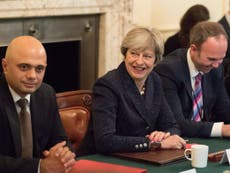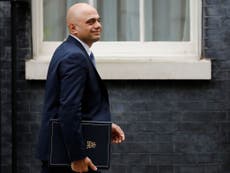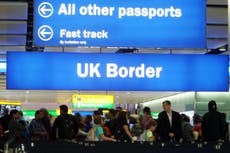Sajid Javid’s flawed immigration policy is doomed to fail
In the home secretary’s new world, business figures and entrepreneurs are welcome – but labourers, NHS cleaners and bus drivers (like his father) are not
It bears repeating. Britain is 100 days away from leaving the European Union and we do not yet have anything like a new migration policy. That might not matter so much if the Article 50 process was paused, or if there is a smooth transition period, in which case migration policy would remain unchanged. However, the lack of any clarity on new migration rules becomes much more alarming if, as seems depressingly likely, a “no deal” option is being seriously contemplated by ministers, with preparations to match.
The one good thing the home secretary, Sajid Javid, does seem to clear on is that the days of targets and caps are over. That is a victory for those, such as The Independent, who have long campaigned for an end to such meaningless and unachievable numbers – the failure to reach them merely devaluing trust in politics.
Our “Drop the Target” campaign has, belatedly, been adopted by the Home Office; the hostile environment regime is no more, and the Windrush scandal a matter of national shame. There has been progress.
Mr Javid, presenting his white paper on immigration to parliament, insists that free movement will end, “deal or no deal”. Strictly, this is not correct in any case, as a deal now would presage a transition period during which free movement would remain, and there is some doubt as to how long that transition period will turn out to be.
If there is a no-deal Brexit, will free movement end at 11pm on 29 March 2019? And if it does, who will or will not be allowed into the UK, for what period, and on what grounds?
For what it’s worth the white paper is vague on crucial matters even if there is a smooth transition period and an as yet unspecified trade deal with the EU for the future. To his credit, Mr Javid has pledged to consult on some of the potentially troublesome aspects of the proposals. Business is not impressed anyway.
Is one year the right length of time for a worker to be permitted to stay in the UK, with no rights to public funds or settlement, with another year as a “cooling-off” period before they are allowed to return?
Is £30,000 the right level of salary to act as a kind of threshold for an immigrant to be eligible to come to Britain? What if their earnings subsequently fall?
More confusion arrives if you try to understand the actual aim of the policy. Mr Javid said that it was simply to get migration to “sustainable” levels. The prime minister’s staff maintain that the tens of thousands target survives, either as a policy or an aspiration. Both cannot be right.
But when Mr Javid speaks of a “sustainable” level of migration, what does he mean? Does he mean the level the economy needs? Or the level that is politically acceptable? They are not the same. His argument is that there is a “Goldilocks” level of migration that boosts the economy but doesn’t put undue pressure on public services. This is an economically illiterate approach, unworthy of an intelligent man such as the home secretary.
Mr Javid, the son of Pakistani bus driver, and proud of it, must know that the snobbishness that has drifted into the debate is absurd. His shadow, Diane Abbott, the daughter of Jamaican immigrants (a welder and a nurse) is another symbol of what migration has done for Britain – working hard and building its prosperity. While the new policy indicates that there should no longer be, as Ms Abbott has it, a preference for a Polish doctor over a Pakistani doctor, Mr Javid’s general approach would mean that neither of these frontbenchers would be in the position they hold today if the UK had imposed such a salary rule in the 1950s or 1960s. A bus driver, welder or nurse from Pakistan or Poland would be refused entry.
In Mr Javid’s new world, “skills” and professional people, business figures and entrepreneurs are welcome – but social care workers, labourers, NHS cleaners, Uber drivers and, er , bus drivers are not. Yet in any advanced economy – Japan is the latest example – with an ageing population and plenty of near-full, well-paid employment, it is the “dirty jobs” at the foot of the labour market where the need for people is greatest, and here immigration is an unstoppable force.
It is also odd for a convinced free marketeer such as Mr Javid to imagine that a system run by bureaucrats could be more responsive than the signals from a dynamic labour market, such as wage levels.
Mr Javid may be right that capital substitution (automation, machinery, artificial intelligence) and some of the local unemployed might make up some of the shortages caused by stricter immigration rules, but they will be nowhere near enough. Wages and costs will be inflated, adding to the economy’s problems post-Brexit. “Global Britain” will be less competitive as a result of this approach.
There is a reason, apart from the EU’s free movement rules, why the government has failed so badly to deploy a targets-led immigration policy over almost a decade – it is impractical. Attempting to run a “points system” in a nation which has a shortage of unskilled as well as skilled labour is equally impractical. The policy will fail, and deserves to.






Join our commenting forum
Join thought-provoking conversations, follow other Independent readers and see their replies